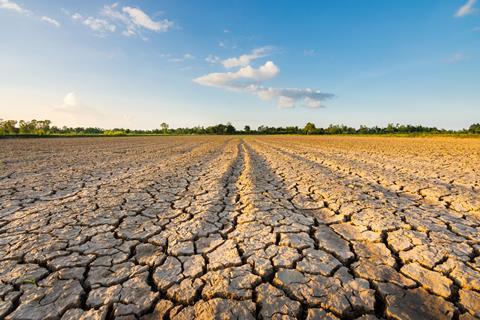Study urges suppliers to take action to avoid empty shelves, with half of UK fruit and veg imports facing severe climate threats by 2050

A new report has identified a significant risk to the UK’s fresh food supply if retailers and importers do not take action to understand and reduce the impact of climate change.
In 2024, the UK imported 47 per cent of its vegetables and 84 per cent of its fruit, making it highly dependent on international growing conditions.
With 2023 confirmed as the hottest year on record, and 22 July 2024 the hottest day ever recorded globally, the report argues that the risk of more frequent and severe extreme weather is no longer abstract.
Importers must prepare for increasingly frequent heatwaves, droughts, and flooding in supplier regions, the researchers said.
The analysis, published on 22 July, was conducted by sustainability consultancy Aethr Associates in collaboration with the Fresh Produce Consortium. It shows that 64 per cent of fruit and veg imports come from just 10 countries, where temperatures are expected to rise by an average of 16 per cent by 2050.
Spain, the number-one source of imported fruit and veg, is expected to go from nine ‘hot days’ (when the average 24-hour temperature exceeds 35°C) a year to 20.
Peru’s number of hot days is expected to increase by 1000 per cent, increasing from one to 11 days a year.
By the same year, 72 per cent of produce from the top 10 importing countries is projected to face extreme water stress, significantly increasing the risk of failed harvests and price volatility.
The UK’s reliance on imported food has grown steadily over the last century, with consumer expectations for year-round supply and changing diets meaning that close to £10 billion is now spent on imports annually.
The last 30 years have seen a marked increase in the consumption of exotic produce such as avocados, mangoes and pineapples. Worryingly, the report found that over the last five years, the UK increased its fruit and vegetable spending by 43 per cent in countries facing extreme water stress.
“The increasing reliance on our fresh food supply from countries with competing demands for limited water supply will lead to more empty shelves and food price inflation like we have seen in recent years,” says one of the report’s authors, Richard Bonn, co-founder of Aethr Associates.
“Climate change and the projections over the next 25 years are really important, and importers need to ensure that existing crop production methods can withstand the climate of 2050.”
The report calls on UK importers to evaluate where their exposure lies and to work closely with growers and suppliers to create mitigation plans.
“Solutions may involve enhancing water storage, moderating the impacts of extreme temperatures, strengthening flood defences, and planting climate-resilient crop varieties,” says Bonn. “Ultimately, success will depend on our ability to adapt through forward-thinking investment in infrastructure and innovation.”
Kelly Shields, technical director of the Fresh Produce Consortium, adds: “Climate change is already reshaping the fresh produce sector, from tougher growing conditions to disrupted supply chains. Like Aethr, we believe this sector is incredibly adaptable to change; it just needs to fully understand that change first. This report is the first time that the data has been put together to highlight the challenge, as well as to shine a light on key solutions.”
To safeguard food security, the authors urge businesses and policymakers to integrate climate risk into strategic decision-making. “We’re sharing our research and methodology to support the industry in adopting a standardised approach to understanding and mitigating climate change risk in their supply chain,” Bonn says.



